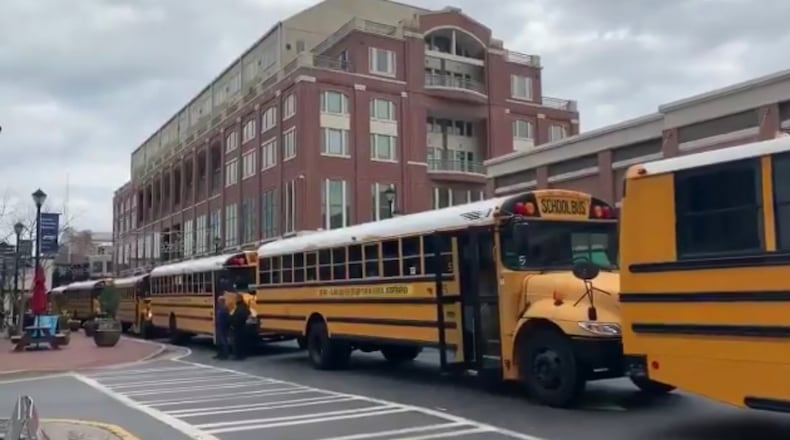Georgia politicians are preparing a raft of new legislation this year to target sex trafficking, including measures that make it easier for law enforcement to prosecute the crime and new ways for government agencies to offer trauma treatment for victims.
Supporters of the new crackdown are using Atlanta’s role as the host of this year’s Super Bowl to amplify their message, calling on Georgians to be vigilant at airports and public gatherings for signs that children are being held against their will.
And victims’ advocates organized an event Wednesday that sent 72 school buses on a route from Midtown Atlanta to Mercedes-Benz Stadium, each with an anti-trafficking message designed to create a mile-long moving billboard through the city’s crowded streets.
“Child sex trafficking is an industry that thrives in darkness,” said Bob Rodgers, the chief executive of Street Grace, an Atlanta-based organization that targets the crime. “Our goal is to develop a network that will continually shine a light on this issue and put an end to the abuse.”
The legislation to be considered during the General Assembly session that begins Jan. 14 has yet to be introduced, but state Rep. Chuck Efstration, R-Dacula, said it will center on two themes. The first would give law enforcement officials more resources to investigate the crime. And the second would create a legal framework between law enforcement, the judicial system, state agencies and advocacy groups to coordinate trauma care.
“We need to address the enablers that allow for human trafficking to occur,” Efstration said. “And we need to have comprehensive services for victims.”
He joined Gov.-elect Brian Kemp, Attorney General Chris Carr and incoming Secretary of State Brad Raffensperger at an Atlantic Station event to watch the launch of the buses.
At the event, Carr emphasized his call for a new anti-gang unit to target a scourge he likened to “modern-day slavery.” And Kemp said to expect aggressive action to toughen penalties on sex traffickers, although he didn’t outline specifics.
“Evil people are committing evil deeds all for a profit,” Kemp said. “We will not back down and we will not waver. We will fight to protect the innocent and pursue the guilty.”
‘Plain sight’
The promise of tougher penalties and more resources for victims continue an effort that’s stretched nearly two decades in Georgia, even though estimates vary widely about how pernicious the problem is.
A 2012 investigation by The Atlanta Journal-Constitution found that despite millions spent on anti-trafficking initiatives, the scope of the problem was unknown and that some agencies failed to keep accurate information about whether taxpayer-funded initiatives were effective.
Georgia lawmakers have markedly ratcheted up efforts to address the crime since 2001, with laws that made the pimping of a child a felony, require teachers and others to report child prostitution, and place the Georgia Bureau of Investigation in charge of investigating child sex trafficking.
A new wave of legislation has been adopted in the past few years. Georgia voters in 2016 approved a tax that requires adult entertainment businesses to pay at least $5,000 to finance a fund designed to provide treatment for victims. And Gov. Nathan Deal signed a law in 2017 that allowed prosecutors to charge people soliciting a victim of sex trafficking with human trafficking violations.
Victims of the crime urged lawmakers to take new steps this year. Shemeka Dawson, who now works as a youth counselor, said Georgians need to educate their children on the dangers of sex trafficking and urge them to steer clear of strangers.
“It happens in plain sight. People don’t believe it happens, but it does,” she said. “People need to open their eyes — literally. It’s going to take all of us collectively to make people aware of this problem.”
Stay on top of what’s happening in Georgia government and politics at ajc.com/politics.
About the Author
Keep Reading
The Latest
Featured




